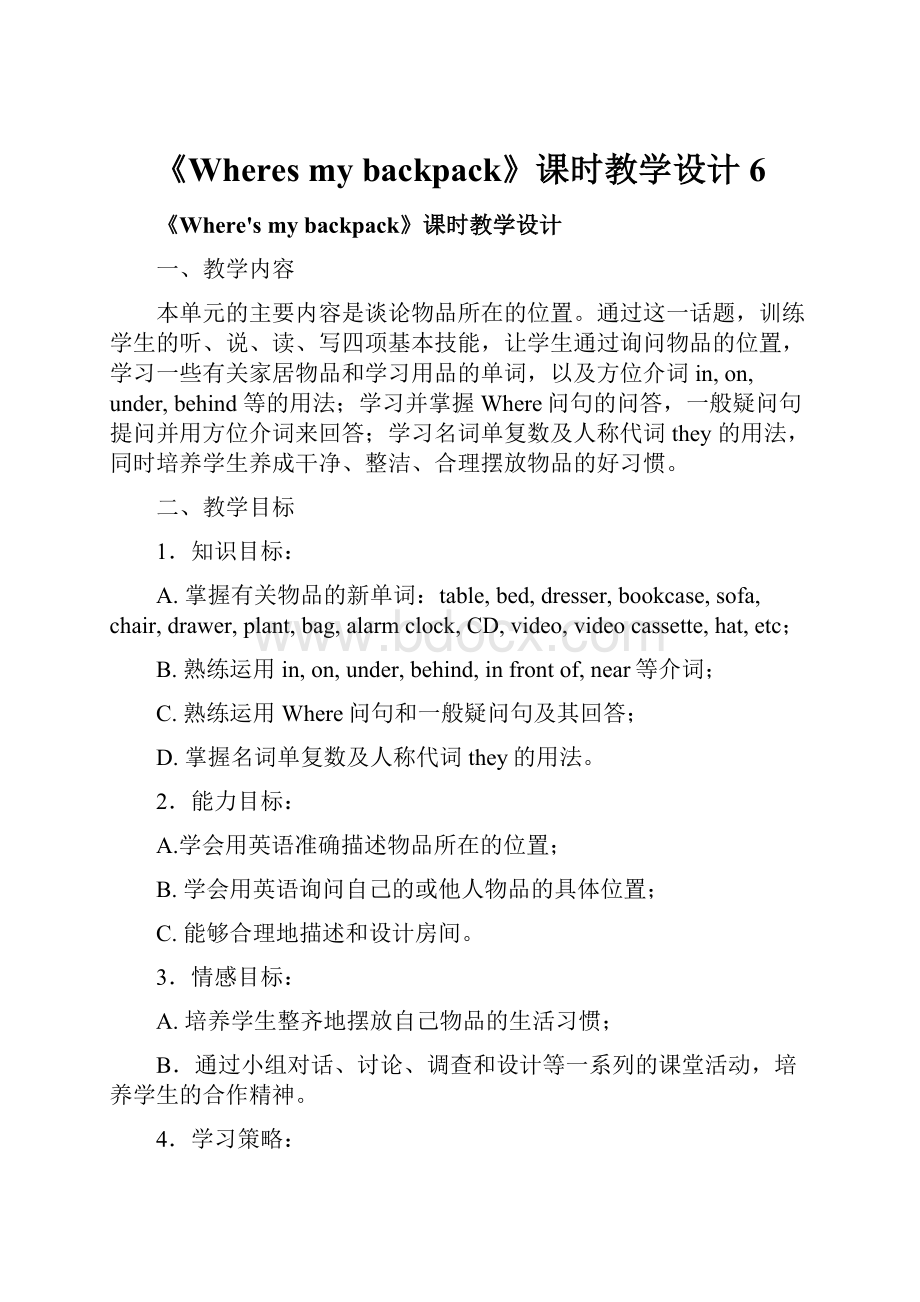《Wheres my backpack》课时教学设计 6.docx
《《Wheres my backpack》课时教学设计 6.docx》由会员分享,可在线阅读,更多相关《《Wheres my backpack》课时教学设计 6.docx(13页珍藏版)》请在冰豆网上搜索。

《Wheresmybackpack》课时教学设计6
《Where'smybackpack》课时教学设计
一、教学内容
本单元的主要内容是谈论物品所在的位置。
通过这一话题,训练学生的听、说、读、写四项基本技能,让学生通过询问物品的位置,学习一些有关家居物品和学习用品的单词,以及方位介词in,on,under,behind等的用法;学习并掌握Where问句的问答,一般疑问句提问并用方位介词来回答;学习名词单复数及人称代词they的用法,同时培养学生养成干净、整洁、合理摆放物品的好习惯。
二、教学目标
1.知识目标:
A.掌握有关物品的新单词:
table,bed,dresser,bookcase,sofa,chair,drawer,plant,bag,alarmclock,CD,video,videocassette,hat,etc;
B.熟练运用in,on,under,behind,infrontof,near等介词;
C.熟练运用Where问句和一般疑问句及其回答;
D.掌握名词单复数及人称代词they的用法。
2.能力目标:
A.学会用英语准确描述物品所在的位置;
B.学会用英语询问自己的或他人物品的具体位置;
C.能够合理地描述和设计房间。
3.情感目标:
A.培养学生整齐地摆放自己物品的生活习惯;
B.通过小组对话、讨论、调查和设计等一系列的课堂活动,培养学生的合作精神。
4.学习策略:
A.交际策略:
学会与他人合作交流,并能把语言材料用到真实的生活中去;
B.资源策略:
学会利用一切可利用的学习资源,如词典,音像资料,网络等来获取更多的学习信息;
C.认知能力:
积极思考,及时反馈;
D.调控策略:
在反思,顿悟和自醒中不断调整自己的学习策略。
三、教学重点、难点
1.重点:
A.方位介词:
in,on,under,behind,infrontof,near等的用法;
B.Where的特殊疑问句和一般疑问句:
Isthe…in/on/underthe…?
的肯定、否定回答;
C.新单词:
bed,dresser,table,bookcase,backpack……
2.难点:
A.能够准确运用方位介词描述物品所在的位置;
B.能够运用Where问句找到物品的位置。
四、教学方法
采用任务型语言教学,实施情景教学法、交际法、情感激励法等教学方法。
五、课时安排
第一课时:
SectionA1a,1b,1c
第二课时:
SectionA2a,2b,2c,3a,3b,3c,4
第三课时:
SectionB1a,1b,1c,2a,2b
第四课时:
SectionB3a,3b,3c,4,Self-check
PeriodOne
课前准备
教师:
制作多媒体课件,准备部分学习用品的实物。
学生:
预习新单词:
听录音机,模仿跟读新单词;准备与本课有关的学习用品实物。
PeriodOne
SubTopic
Talkabouttheroom
Functions
Talkaboutwherethethingsare.
Vocabulary:
where,table,bed,dresser,bookcase,sofa,chair,drawer,plant,in,on,under,they,they’re=theyare
Structures
Where’s…?
It’sin/on/under…
Where’re…?
They’rein/on/under…
Tasks
Listing
Makeasurvey
StepOneWarmingup
PlayanEnglishsongbeforeclass.
Revisesomeschoolthingsbyaskingquestions.
e.g.:
What’sthis?
Isthisa…?
Howdoyouspellit?
etc.
Learnthenewwordsin,on,under,behind…byhelpingtheteacherfindthelostthings.
e.g.:
T:
Where’smyEnglishbook?
S1:
It’shere./Ithinkit’s…
T:
Oh,it’sonthedesk.
…
T:
Where’remycolorpencils?
S2:
…
Teachthenewword“where”andtheuseof“they”.
Consolidatetheprepositionsbylookingatthescreenandanswerthequestions:
Where’s…?
Where’re…?
设计意图:
通过设置让学生帮助老师找东西这样一个真实的场景来导入新课,能够立刻调动学生的参与性,激发学生思维,启动学习的发生。
StepTwoGame:
Hideandlookforthings
Studentshideandlookfortheschoolthingsinpairs.Onestudenthideoneschoolthingandask:
Where’s…?
Where’re…?
Theotherstudentguessandanswer:
It’sinyourdesk.Theyareinyourpencilcase.etc.Asksomepairstosharetheirperformance.
设计意图:
通过学生之间相互猜测的游戏,能使他们刚被激发的兴奋点持续下去。
StepThreeNewwordslearning
Showthestudentsapictureofaroom,tellthemthisisabedroom,letthestudentslistthethingsinitfirst.Thenshowthemthewholepicture,teachthenewwords,askwherethethingsare,letthestudentsanswer,usingtheprepositions.
Repeatwithasittingroomandastudy,teachthenewwordsandpracticeinthesameway.
设计意图:
由于课前引导学生通过自主学习初步接触本课要学的新单词,所以在新单词的教学过程中,一些有能力的学生可以将自己已有的认识水平与实际运用结合起来,使他们能体会到通过自主学习带来成功的满足感。
通过这样的方法呈现新单词,效果远比教师单纯地用图片来传授新单词要大。
任务运用:
Listing
StepFourMakeupdialogues
SectionA,1a:
Matchthewordswiththethingsinthepicture.Studentsdoitindividuallyfirst,thenchecktheanswers.
SectionA,1c:
Makeupdialoguesinpairs,usingthethingsinthepicture.
StepFiveListenandsayListenandimitatethedialoguesinSectionA,1b.
StepSixSummary:
Amemorytest
Showapictureofaroom,givethestudentsoneminutetolookatit,thenaskthemwhatkindofthingstheysawandwherethethingsare.Haveacompetitionamonggroups.Seewhichgroupcanrememberallthethingsandplaces.
设计意图:
通过这种活动调动学生的视觉、感觉和记忆力来参与语言活动,并且使本课的主要语言知识得到重现,加深印象;同时,小组之间的竞赛体现了协作和团队精神。
任务运用:
Listing
Homework:
Copythenewwordsandtrytorememberthem.
Makeasurvey:
Interviewoneofyourfriendsorteachers.Fillintheformbelow.
Name
Things
Places
Ms.Zhang/
LiuHai
sofa
nearthewall
设计意图:
语言知识学习与实际生活相结合,培养使用英语的思维。
任务运用:
Makingasurvey
PeriodTwo
课前准备
教师:
准备表格、一些学习用品和多媒体课件。
学生:
学习用品
PeriodTwo
SubTopic
Talkabouttheroom
Functions
Talkaboutwherethethingsare
Recycledlanguage
Whereis…?
It’son/in/under…
Whereare…?
They’rein/on/under…?
Structure
Isthebook/Arethebooksonthedesk?
Yes,…/No,…
Idon’tknow.
Tasks
Listing
Comparing
StepOneWarmingup
Chatting.Chatwiththestudentsaboutthethingsaroundtheroombyshowingthempictures.Askthestudentstospellthenewwords.
设计意图:
根据学生的年龄特征,他们非常喜欢这种情景猜测活动。
这可以调动他们各方面的情绪来参与语言活动,激活他们已有的知识水平。
任务运用:
Listing
StepTwoListenandimitate
SectionA,2a.Revisewhatthethingsare.Playthetapeforstudentsandletthemnumberthem.
SectionA,2b.Playthetapeagain,studentsnumberthethings[1-6]inthepicture.Imitatethedialogues.
StepThreeAguessinggame
Aguessinggame.Showthestudentsapictureofaroomwithafewthingsinit.Havethemguesstheplacesoftheotherthings.
e.g.:
T:
Thereisabookcaseinit.Isthebookcasenearthebed?
Ss:
Yes,itis./No,itisn’t.
Writethegeneralquestionandtheanswersontheblackboard.
StepFourPairwork
SectionA,2c.Lookatthepicturein2bagain.Studentsusegeneralquestionstoaskandansweraboutthethingsinit.
StepFiveGame:
Findthedifference
SectionA,4.StudentAlooksatPicture1(TextbookP21.4),StudentBlooksatPicture2(TextbookP19,1a).Askandanswerinpairsandfillintheform.
e.g.:
SA:
Whereisthebackpack?
Isitunderthetable?
SB:
No,itisn’t.It’sonthetable.
Things
Picture1
Picture2
backpack
underthetable
onthetable
pencilcase
books
keys
dog
Asksomestudentstoreporttheiranswerlikethis:
InPicture1,thepencilcaseis…InPicture2,thepencilcaseis…;InPicture1,thebooksare…InPicture2,thebooksare…
设计意图:
设置任务,通过对比的方式让学生理解方位介词。
利用表格直观体现出两幅图的不同点,再将它的不同点复述出来,其目的在于培养学生的语言组织能力。
作用运用:
Listing&comparing
StepSixPracticethedrill“Whereis/are…?
”
Presentshortdialogues,usingpicturesorobjectstohelp.
Dialogue1:
A:
Where’smybag?
B:
Idon’tknow.Isitonthesofa?
A:
No,itisn’t.
Dialogue2:
A:
Where’remybooks?
B:
Idon’tknow.Aretheyonthebed?
A:
Yes,theyare.
Teach“don’t=donot”,“know”.
CheckthehomeworkinPeriodOne.Makereportstosharetheinformationtheygotfromthefriendsorteachers,andgivetheirsimplyassessment.
设计意图:
话题由课本知识向实际生活延伸,体现语言的语用原则。
LetthestudentsmakesimilardialoguesaccordingtothepicturesinSectionA,3a&3c.
Putthedialogueintherightorder.(SectionA,3a.)
设计意图:
通过对这个句型的大量操练,使学生掌握该句型的用法,避免单调枯燥的语法讲解。
Homework:
Finishofftheexercisesintheexercisebook.
Actoutthedialogues.(SectionA,2a&2b.)
设计意图:
由课堂活动向课外延伸。
任务运用:
Action
PeriodThree
课前准备
教师:
准备表格、与本课有关的实物和多媒体课件。
学生:
学习用品
PeriodThree
SubTopic
Talkabouttheroom
Functions
Talkaboutwherethethingsare
Recycledlanguage
Alarmclock;videocassette;CD;mathbook;computergame
Where’s…?
It’sin/on/under…
Where’re…?
They’rein/on/under…
Structure
Themathbookisonthedresser.
TheCDsareonthebookcase.
……
Tasks
Listing&sharing
StepOneWarmingup
AsksomepairstoactoutthedialoguesinSectionA,2a&2b.
StepTwoNewwordslearning
Showthestudentsapictureofaroom.Letthestudentssaylikethis:
TheIDcardisonthetable.
Thebooksareonthechair.
Letsomeablestudentslistsomenewwords.Practicereadingthem.
Matchthenewwordswiththethingsinthepicture.(SectionB,2a.)
Pairwork.Talkaboutthepicture.(SectionB,1b&1c.)
设计意图:
培养学生语句组织能力,通过直观图片学习第二部分新单词,并在小组活动中加以操练。
任务运用:
Listing&sharing
StepThreeListen,circleandwrite
PlaythetapetwiceforstudentstolistenandcirclethethingsTommywantsfromhisroom.Checktheanswers.(SectionB,2a.)
Listenagain.WritedownthesentenceaboutwhereTommy’sthingsare.Checktheanswers.(SectionB,2b.)
StepFourGroupwork:
DecoratetheroomforEmma.
ShowthestudentsapictureofEmma’suntidyroom.
Groupwork.DecoratetheroomforEmma.
Makeareport.
设计意图:
延续自我评价活动,把个人的生活经验与实际结合起来,完成自我观点的sharing,同时为最后的Project打基础。
任务运用:
sharing
StepFiveSelf-assessment
Groupwork
Things
Places
Yes
No
Score
backpack
onthechair
10
pen
inthepencilcase
10
notebook
onthebookcase/inthebackpack/onthedesk
10
keys
Inthedrawer/bag
10
dictionary
onthebookcase/inthebackpack/onthedesk
10
alarmclock
onthebed/desk
10
socks
inthedrawer
10
pictures
onthewall
10
shoes
underthebed
10
CDs
onthedesk/bookcase
10
Total:
Yourfinallyscore:
70~100:
Youkeepyourroomverytidy.
40~60:
Youkeepyourroomalittletidy.
0~30:
Youkeepyourroomuntidy.
设计意图:
培养学生养成整洁、干净、合理摆放物品的好习惯。
Homework:
Finishofftheexercisesintheexercisebook.
Writeatleast8sentencestodescribeyourbedroomtoyourfriends.
设计意图:
培养学生的写的能力。
由口头训练转向笔头训练,单句的练习为下一步的篇章书写打下基础。
PeriodFour
课前准备
教师:
多媒体课件;单词卡片;
学生:
学习用品
PeriodFour
SubTopic
Askforhelp
Languagefocus
take…to;bring…to;can,need
Recycledlanguage
thing,room,desk,TV,floor,some
Thebookisonthetable.
Thepensareinthepencilcase.
Structure
Ineed…for…
Canyoubringsomethingstoschool?
Pleasetakethesethingsto….
Tasks
Comparing
Problemsolving&sharing
StepOneNewwordslearning
Presentthenewwordsbymakingconversationswithstudents.Showsomepicturesandwordsonthescreentohelp.
e.g.:
T:
What’sthis?
S1:
It’saroom.
T:
Doyouhavearoomlikethis?
S1:
Yes,Ido./No,Idon’t.
(Repeatwiththeotherwords:
TV,desk,…)
(Showacardwithawordandask)
T:
Canyouspellthisword?
S2:
Yes,Ican./No,Ican’t.
(Letthemknowthemeaningof“can”.)
T:
Canyouspellyourname?
S3:
Y